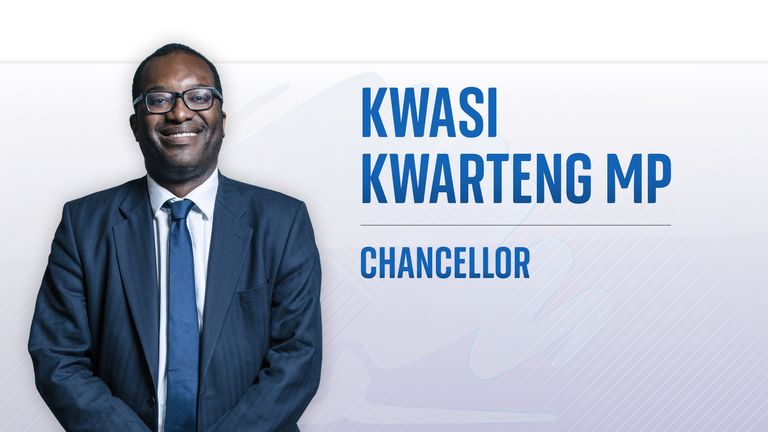Truss appoints top team – with Kwasi Kwarteng as chancellor
Liz Truss has begun appointing her cabinet after being officially asked by the Queen to form a new government.

Liz Truss has begun appointing her cabinet after being officially asked by the Queen to form a new government.
Shortly after making her first speech as PM, details began to emerge as to who would be in Ms Truss’s new cabinet.
Chancellor: Kwasi Kwarteng
Kwasi Kwarteng, formerly Boris Johnson’s business secretary, has been confirmed as the new chancellor.
He replaces Nadhim Zahawi who took up the role when his predecessor Rishi Sunak quit, saying in his resignation letter to Mr Johnson that their approaches to the economy were “fundamentally too different”.
The Eton-educated son of Ghanaian immigrants, Mr Kwarteng only took up his first cabinet role last year, but has been a long-term ally of Ms Truss’s since they entered the commons together back in 2010.
Big names confirm departures and newcomers enter Number 10 – live politics updates
On the eve of the Tory leadership election result, Mr Kwarteng wrote a piece in the Financial Times promising that Ms Truss’s government would behave “in a fiscally responsible way” as ministers seek to ease the burden of the cost of living crisis.
Mr Kwarteng will hold the purse strings in Number 11 and play a pivotal role in how the government chooses to deal with the cost of living crisis the country is currently facing.
Health secretary and deputy PM: Therese Coffey
The former work and pensions secretary has been rewarded for her loyalty to Ms Truss and promoted to health secretary and deputy prime minister.
Ms Coffey climbed the ranks in government under former prime ministers David Cameron, Theresa May and Boris Johnson – but her position as one of Ms Truss’s closest political allies has landed her in charge of dealing with the mounting problems facing the NHS and social care sector.
She followed Ms Truss into CCHQ yesterday as the result of the Tory leadership contest was revealed, and chaired the new PM’s campaign to be leader.
Ms Truss and Ms Coffey have been close friends since running for parliamentary candidate selection together in 2009 – Ms Truss got the Norfolk seat they both went for but Ms Coffey then got the nearby seat of Suffolk Coastal.
Reports on Monday suggested that Ms Coffey has already been receiving briefings on the NHS from top civil servants at the Department for Health.
The importance of the role of deputy prime minister was illuminated in 2020 when Dominic Raab was put in charge of running the country while Mr Johnson was hospitalised with COVID.
Foreign secretary: James Cleverly
James Cleverly – a fellow loyalist of Mr Johnson and someone who has previously worked in the Foreign Office as a minister for two years – has been promoted to foreign secretary.
He replaces Ms Truss herself who never resigned from her role before partaking in her successful party leadership campaign.
When Ms Truss was foreign secretary, Mr Cleverly – whose mother is from Sierra Leone – effectively acted as her deputy.
Mr Cleverly, who has also held the role of deputy Conservative Party chairman, was one of the three individuals appointed as education secretary in just three days in the dying moments of Mr Johnson’s government.
Who’s out?
Ahead of cabinet appointments being announced by the new PM, some members of Mr Johnson’s government who had supported Ms Truss’s leadership rival Mr Sunak confirmed that they would not be part of her top team.
Dominic Raab, who had served as both deputy prime minister and justice secretary, was the first to reveal his departure.
He said he would be “supporting the government from the backbenches”.
Mr Raab was followed by former transport secretary Grant Shapps, who promised to be “a strong, independent voice” outside of cabinet”.
Steve Barclay – who most recently served as health secretary, but has also held roles in both the Treasury and the Cabinet Office – also confirmed he would not be featuring in Ms Truss’s government.
As did Greg Clark, who said he had enjoyed fulfilling the role of levelling up secretary “enormously”.
Confirming his departure, former environment secretary George Eustice pledged to “offer scrutiny” from the backbenches.
Johnny Mercer, Mr Johnson’s veterans’ affairs minister, said he was disappointed” to have been “relieved of my duties in government”.
Former Northern Ireland secretary Shailesh Vara was another MP who stated he would not be serving in a front bench role under Ms Truss.
While Andrew Stephenson confirmed on social media that he is no longer Conservative Party chairman and wished his successor the best of luck.
